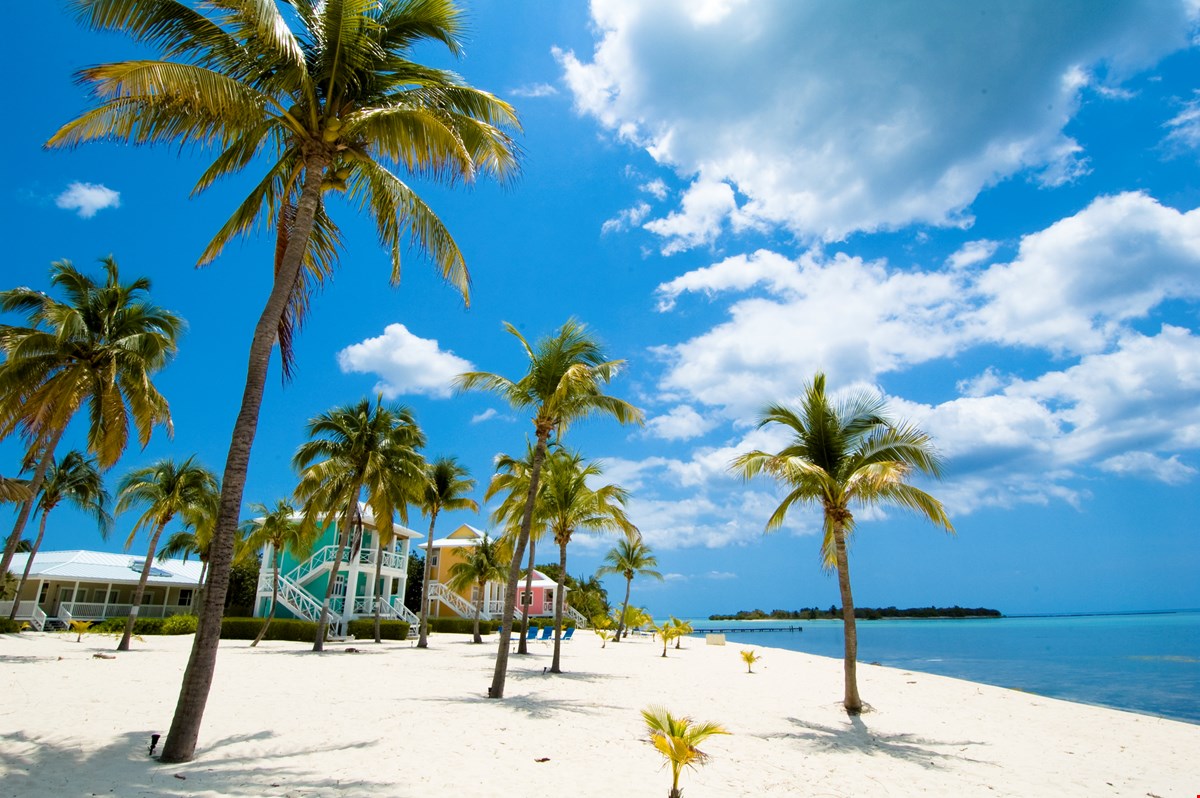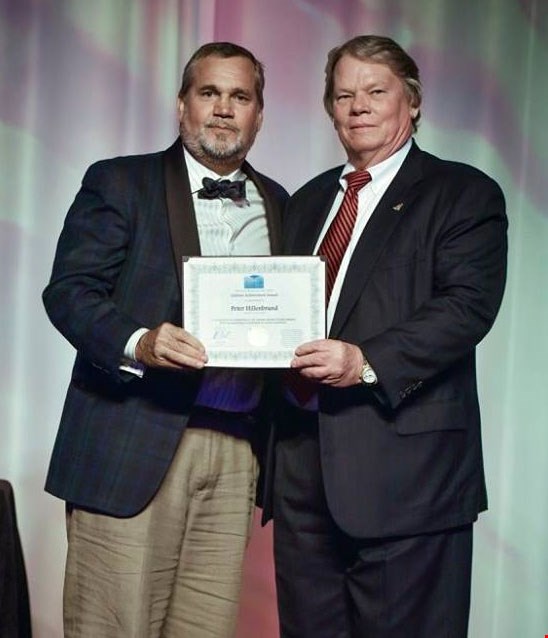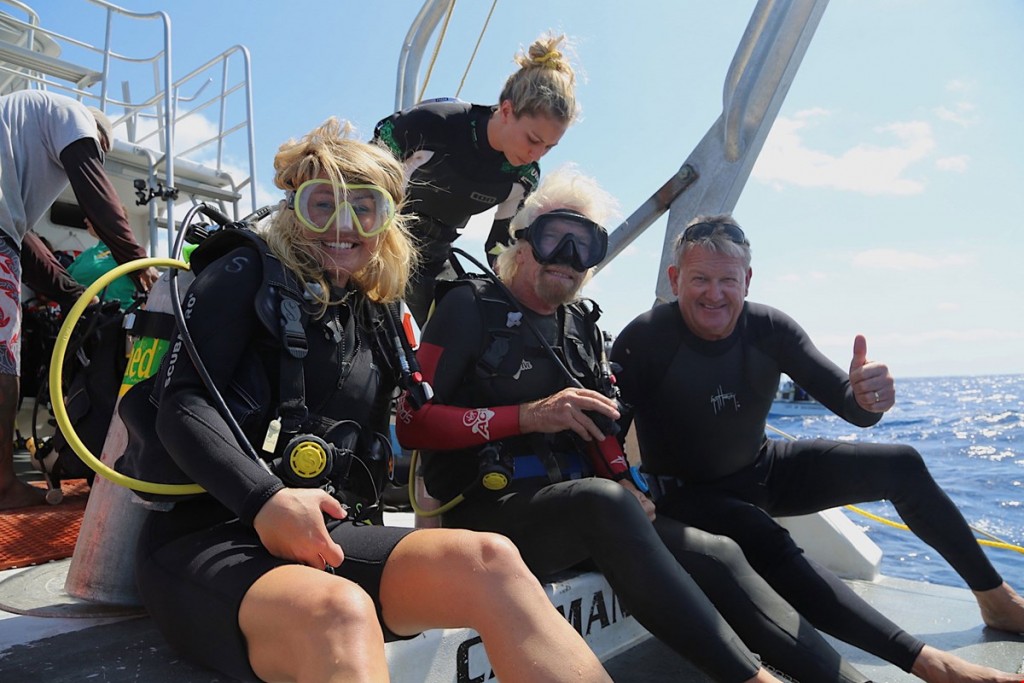Marine Life & Conservation
Conservation, Customer Service and Tourism Awards; 2017 is off to a Good Start at the Southern Cross Club

Little Cayman Resort receives high ranking in TripAdvisor awards and high praise for its support of annual Grouper Moon Project
So far, 2017 has been a remarkable year for the Southern Cross Club in Little Cayman. First, the online travel site TripAdvisor.com named the resort to its top 25 in the Caribbean in two categories based on customer reviews: Best Hotel for Service and Best for Romance. Adding to the awards, administrations manager Neil van Niekerk was named an “Emerging Hero in Tourism” by the Cayman Islands government, and resort owner Peter Hillenbrand was recognized for his “Long Service to Cayman Tourism.”
Hillenbrand has also received a lifetime achievement award from the Cayman Islands Tourism Association for taking a run-down resort 40 years ago making it one of Cayman’s best. With a stunning location, distinct personality and outstanding service, the Southern Cross Club keeps its guests returning year after year for its barefoot elegance.
“The Southern Cross Club is the proudest achievement in my life,” said Hillenbrand. “But here are many people who also work hard to make the resort the success.”

Peter Hillenbrand receiving his Lifetime Achievement Award from the Hon. Moses Kirkconnell, Minister for Tourism

Neil van Niekerk (center) receiving recognition an “Emerging Pioneer” for tourism of the Cayman Islands
Peter Hillenbrand credits resort staff with high standards in customer service and a shared mission to preserve Little Cayman’s natural environment, which guests love. This commitment to conservation is the reason he offers the resort and his own home every winter to the Grouper Moon Project, an on-going effort to protect the last known healthy and growing Nassau Grouper spawning aggregation site in the Caribbean.
The Cayman Islands Department of Environment and the Reef Environmental Education Foundation (REEF), a non-profit that aims to protect marine life through research and education, have been monitoring and studying the annual aggregation of groupers at a site off the West end of Little Cayman where they come to spawn. The Guy Harvey Ocean Foundation (GHOF) joined the effort in 2011 and now provides financial aid plus an educational platform to create awareness. Without the help and participation of the Southern Cross Club and the entire Little Cayman community, the important work being done by these scientists could not happen.
“We came perilously close to losing the aggregation site in 2001,” said Hillenbrand, who is an active team member. “Today, the project is a model for the importance of protection, fishing regulation, and the science it takes to teach us what we need to do to manage sustainable fisheries.”
This February, entrepreneur, and philanthropist Sir Richard Branson made two dives at the aggregation site at the invitation of Dr. Guy Harvey of the GHOF. Sir Richard maintains a home in the British Virgin Islands, and because the Nassau Grouper is critically endangered across the Caribbean, Dr. Harvey wanted him to see the successful conservation work being done in Little Cayman.

Sir Richard Branson preparing for a dive at the Grouper spawning site in Little Cayman. He was invited by Dr. Guy Harvey, (left) to come observe the Grouper Moon Project. Lauren Keil, Foundation Manager of Unite BVI is shown next to Sir Richard and Holly Branson is behind her father
“We had the great pleasure of diving in the spawning site and seeing the remarkable spectacle for ourselves. To me it was one of the top 20 wonders of the world,” wrote Sir Richard in his blog about the experience. “I’ve come back to the BVI determined to see if there’s’ any chance of reinvigorating groupers here.”
Education and awareness are key components of the Grouper Moon Project. The idea of exporting the Grouper Moon Project to the British Virgin Islands and reviving historical spawning sites there is an exciting prospect.
“This year we witnessed the recruitment of many 6-year-olds which suggest that a large number of the juveniles we saw five years ago — we filmed them in the back reef and around Owen Island — survived to adulthood!” said Dr. Harvey. “This highlights the importance of a dedicated long term monitoring and protection effort.”
“There are no accessible places like Little Cayman left in the Caribbean,” said Peter Hillenbrand. “What she is, and what she means to those of us who love her, is precious beyond compare. There is nothing more important than caring for our planet, our earth, our marine resources.”
About the Southern Cross Club
The casually sophisticated Southern Cross Club Fish & Dive Resort is Little Cayman’s original resort. It features 14 beachfront bungalows complete with a top-rated, professional in-house diving and fishing operation. A unique blend of rusticity and elegance the resort is often described as “Barefoot Luxury”. Little Cayman is renowned for its breath-taking coral reefs and pristine environment, and the Green Globe certified Southern Cross Club sets sustainability standards to protect it. The resort was awarded the 2013 Cayman Islands Tourism Association CEPTS Stingray Award for its exceptionally good stewardship of the environment and its ongoing commitment to preserving it. Guests to the Southern Cross Club can expect friendly and diligent service, delicious award-winning food, inviting rooms with breath-taking views and a comfortable dive boat ― a few of the things that bring them back year after year. The resort’s beach-based location also provides flats fisherman with access to Bonefish and Permit just minutes away.
For reservations or more information:
Telephone: 1 (800) 899-CLUB (2582)
Outside the USA: (619) 563-0017
E-mail info@southerncrossclub.com
Website: www.southerncrossclub.com
Facebook: www.facebook/SouthernCrossClub
Marine Life & Conservation
Paul Watson Released as Denmark Blocks Japan’s Extradition Bid

Renowned anti-whaling activist Paul Watson has been released from custody in Greenland after spending five months in detention. Denmark’s Justice Ministry rejected Japan’s request for his extradition, citing insufficient guarantees that his time already served in custody would be credited against any potential sentence.
The 74-year-old Canadian-American was arrested on July 21 in Nuuk, Greenland’s capital, when his ship docked to refuel. His arrest was based on a 2012 Japanese warrant related to a 2010 encounter in Antarctic waters. Japan alleged Watson obstructed operations and caused damage to a whaling research ship during efforts to disrupt illegal whaling. Watson has consistently denied these claims, maintaining his commitment to marine conservation.
Denmark, which oversees extradition matters for Greenland, concluded that while the legal conditions for extradition were met, the lack of assurances from Japan regarding time-served credit made extradition untenable.
In a video shared by his foundation, Watson expressed gratitude and relief, saying, “After five months, it’s good to be out… and good to know they’re not sending me to Japan.” He added that the most difficult part of his time in custody was being separated from his two young sons.
Watson is a pioneering figure in marine conservation, known for founding the Captain Paul Watson Foundation in 2022 after decades of activism with the Sea Shepherd Conservation Society. His bold efforts to defend marine life have earned him widespread support, including from celebrities and conservationists. His work has also been featured in the acclaimed reality TV series Whale Wars.
Watson’s lawyer, Jonas Christoffersen, praised the decision, stating, “We are happy and relieved that Paul Watson is now free.” He added that Watson is eager to reunite with his family and continue his vital work.
The arrest occurred while Watson’s vessel, the M/Y John Paul DeJoria, was en route to the North Pacific with a team of 26 volunteers to intercept a Japanese whaling ship. His foundation described the arrest as politically motivated and emphasized that Watson’s actions were focused on ending illegal whaling practices.
Japan resumed commercial whaling in 2019 after leaving the International Whaling Commission, asserting that whale meat is a cultural tradition. Conservationists, however, continue to challenge these practices, highlighting their impact on marine ecosystems.
Despite the challenges, Watson remains steadfast in his mission to protect marine life and bring attention to whaling practices. His dedication to ocean conservation has made him a globally respected advocate for the environment.
Marine Life & Conservation
12 Days of Zero-Waste Fish-mas

This holiday period, the Marine Conservation Society, the UK’s leading ocean membership charity, invites you to make some simple changes to eating fish this Christmas to help our seas.
Dr Kenneth Bodles, Head of Fisheries and Aquaculture at the Marine Conservation Society, said, “During the festive season, our consumption increases, but so does waste. Sustainability isn’t just about where food comes from – it’s also about how you use it. By reducing waste and making the most out of your seafood, you’re not only taking steps to be more ocean-friendly, but can also help to cut costs during what is often one of the most expensive times of the year”.
The Marine Conservation Society has compiled twelve tips on how to consume seafood sustainably with zero-waste this Christmas:
Buy whole fish instead of fillets
Instead of fillets, consider buying whole fish such as salmon, hake, or lemon sole. By adopting a “nose to tail” approach with cooking, whole-baked fish not only feeds a crowd, but also helps to minimise waste and maximise sustainability by using up every part of the animal, including bones, skin, and fat.
Make fish stock
Leftover fish bones or shells can be put to good use by boiling them to make a nourishing fish stock or bisque. This can be frozen and preserved for later use and makes for a flavourful base in a soup.
Make your own fish pâté
Avoid waste by turning leftover fish, such as smoked mackerel or salmon, into a delicious pâté by blending with cream cheese and lemon. Perfect when paired with crackers.
The sustainability of salmon and mackerel varies depending on where and how it is caught or farmed. For more information on green-rated options, check the charity’s Good Fish Guide.
Buy frozen
By purchasing seafood that is frozen or vacuum-packed, this helps to reduce waste by extending the shelf life of your food.
Fish pie
If you’re wondering what to do with leftover cooked fish, why not opt for a classic fish pie with mashed potatoes, leeks, and a cheesy sauce? A sure crowd pleaser on Boxing Day.
Use the head
Don’t forget the fish head! The meat is incredibly tender and flavourful. The charity recommends a cod’s head curry or recreating Fallow’s renowned cod’s head in siracha butter.
By stretching your ingredients further, not only is this a more sustainable way to enjoy seafood, but also cost-effective by repurposing leftovers and cooking creatively.
Boxing Day brunch
Mix leftover kippers or smoked salmon with scrambled eggs for a tasty, zero-waste, Boxing Day brunch.
For best choice, make sure you buy kippers, or herring, from the North Sea and the North Irish Sea.
Zero-waste storage
A top tip from the Marine Conservation Society to avoid waste is freezing fish offcuts to save for future use.
Crisp up the skin
Even leftover fish skin can be turned into a quick savoury snack by crisping it up in an air fryer with a little olive oil and salt.
Anchovies two ways
Leftover anchovies can either be blended with butter to make a delicious anchovy butter or tossed into pasta for a hit of umami flavour.
The charity recommends opting for anchovies caught in the Bay of Biscay for best choice.
Fishcakes
For an easy, zero-waste meal, leftover seafood trimmings can be mixed with mash and fried in breadcrumbs to make fishcakes.
Pickled mussels
Try pickling mussels in 1:1 vinegar and water, with a dash of sugar for a sustainable, zero-waste snack that can be enjoyed well beyond the festive season.
Mussels farmed in the UK are a seafood superhero. Grown using low-impact methods and harvested by hand, they get all the food they need from the sea around them. This makes them one of the most sustainable, ocean-friendly, and cost-effective seafood options.
Players of People’s Postcode Lottery have raised £6.6M towards the Marine Conservation Society’s vital work in making seafood more sustainable.
Laura Chow, Head of Charities at People’s Postcode Lottery, said: “Fish is a festive favourite for many, but making sustainable choices when it comes to how we buy and eat seafood makes all the difference for our ocean. Support from players of People’s Postcode Lottery has helped the Marine Conservation Society further its sustainable seafood work, so that we can all enjoy healthier, better protected seas.”
The Marine Conservation Society encourages you to make sustainable seafood choices a year-round habit, not just for Christmas. To check how sustainable the seafood on your plate is, you can visit the charity’s Good Fish Guide. The Guide helps consumers and businesses identify the most sustainable seafood using a simple traffic light system, based on where and how species are caught or farmed. Green is the best choice, amber means improvements are needed, and red indicates fish to avoid buying.
Zero-waste gift idea
Why not embrace a zero-waste Christmas by gifting a membership to support marine conservation? It’s a meaningful, low-waste gift that helps protect our ocean for generations to come. Memberships start from as little as £5 a month – the price of a sandwich and drink from your local coffee shop.
Find the latest sustainable seafood advice for wild-caught and farmed seafood on the Good Fish Guide, downloadable to your phone from www.mcsuk.org/goodfishguide.
-

 News2 months ago
News2 months agoIconic SS United States to become the World’s Largest Artificial Reef
-

 News3 months ago
News3 months agoBook Review – 52 Assignments: Underwater Photography
-

 Gear News3 months ago
Gear News3 months agoDYNAMICNORD – New German diving brand enters the British market
-

 News3 months ago
News3 months agoExploring Cenote El Pit: A Diver’s Dream
-

 Gear News3 months ago
Gear News3 months agoTry BARE drysuits (and maybe even win one!) this Friday with Sea & Sea at North West Dive Fest
-

 Marine Life & Conservation3 months ago
Marine Life & Conservation3 months agoBook Review: Coral Triangle Cameos
-

 Blogs2 months ago
Blogs2 months agoDive the Egyptian Red Sea this Autumn with Regaldive
-

 News3 months ago
News3 months ago2024 Ocean Art Underwater Photo Competition Announced



